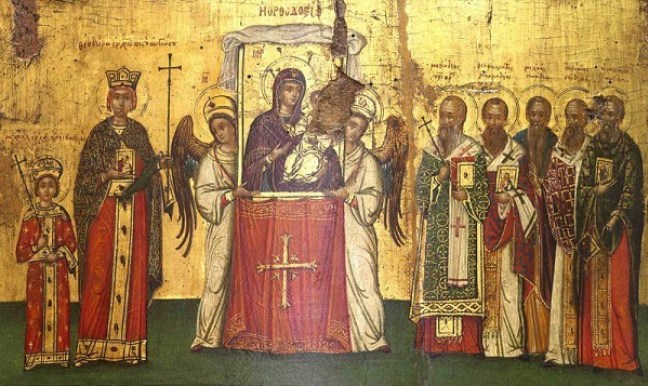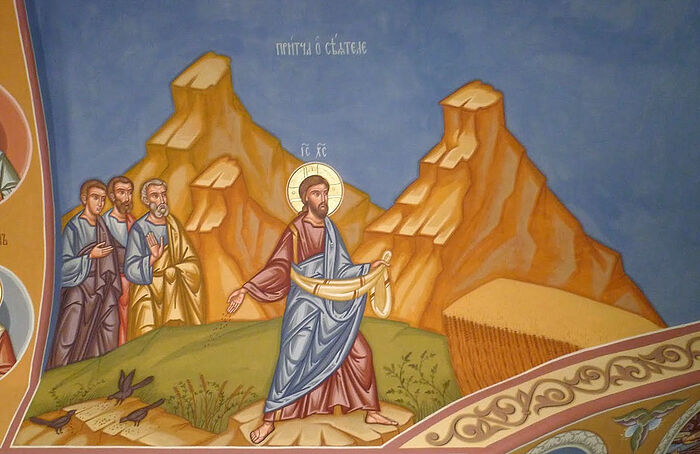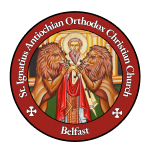Dear brothers and sisters,
This is weekly newsletter #23 of the St Ignatius Parish in Belfast
Contents of this Newsletter:
- Message from Fr Dmitry: Fathers of the 7th Ecumenical Council
- News and Announcements
- Homily on this Sunday’s Gospel: On hearing God
Message from Fr Dmitry: Fathers of the 7th Ecumenical Council
Blessed Feast of the Holy Fathers of the Seventh Ecumenical Council, which falls on a Sunday between October 11 and 18. On this day, the Church remembers the 350 holy fathers who gathered in Nicaea in 787 AD to defend the veneration of the holy icons against the heresy of iconoclasm. This heresy had spread throughout much of the Orthodox world, especially within the Byzantine Empire, and led to persecution and martyrdom of many faithful and to the destruction of countless icons.
You can read more about the Council and history of the iconoclastic heresy here: https://www.antiochpatriarchate.org/en/page/the-seventh-ecumenical-council/802/
The Fathers of the Council defended the Orthodox teaching that venerating icons is not idolatry. We do not worship wood or paint. The image leads us to the prototype, the person depicted. Our Lord Jesus Christ can be depicted because He became incarnate, taking on human flesh and ascending with it into Heaven. This is how we know Him, how the Apostles saw Him, and how we can still encounter Him. When Christ is depicted, in venerating the icon we worship God. When a saint is depicted, our veneration is directed to the saint.
Icons are like windows to paradise. They help us to encounter the person represented and draw us into deeper mystical communion with God and His saints. Hence the Fathers of the the Council proclaimed:
“The sacred and life-giving cross is everywhere set up as a symbol, so also should the images of Jesus Christ, the Virgin Mary, the holy angels, as well as those of the saints and other pious and holy men be embodied in the manufacture of sacred vessels, tapestries, vestments, etc., and exhibited on the walls of churches, in the homes, and in all conspicuous places, by the roadside and everywhere, to be revered by all who might see them. For the more they are contemplated, the more they move to fervent memory of their prototypes. Therefore, it is proper to accord to them a fervent and reverent veneration, not, however, the veritable adoration which, according to our faith, belongs to the Divine Being alone—for the honor accorded to the image passes over to its prototype, and whoever venerates the image venerates in it the reality of what is there represented.”
Through the intercessions of the Holy Fathers of the Seventh Ecumenical Council, O Christ God, have mercy on us and save us. Amen.

News and Announcements:
- Byzantine Music School – Registration Open: With the blessing of His Eminence Metropolitan Silouan, registration is now open for the St John of Damascus Byzantine Chanting School for the academic year 2025/2026.. This four-year programme follows the curriculum of the St Romanos the Melodist Ecclesiastical Music School in Beirut and is designed to train chanters in Byzantine Ecclesiastical Music for service in the Church. Weekly online lessons begin on 20 October 2025, with an enrolment musical assessment for new students on 21 October 2025. Key information:
- Open to students aged 12 and over
- Lessons are in English
- Annual fee: £150
- Registration closes on 20 October 2025
- Link to register: https://docs.google.com/forms/d/e/1FAIpQLSfjowL-KMNdFT4PmuUzT9auZe0MK9i1VctitvE_7E71Nuq_Ug/viewform
- For question contact Mr Hadi Tannous at 07943 242530
- New Catechesis Class Began – Asking for Your Prayers: We are joyful to share that 19 people have joined our new catechesis class. We held the introductory session last week, and proper classes begin this week as participants embark on a journey of learning about the Orthodox faith. Please keep our catechumens in your prayers as they begin this important stage of their spiritual journey!
- Weekly Online Faith & Fellowship Meetings on Wednesdays: Join us for our next regular weekly Zoom meeting on Wednesday, 15th of October, at 7:00 PM (UK time): https://ucl.zoom.us/j/97707660214 This week, we will pray Little Compline and discuss the Gospel reading for the next Sunday
- Join our WhatsApp Announcement Group – A reminder that our Parish WhatsApp Announcements Group is the simplest way to stay connected with parish life. Through the group chat, you will receive service reminders, parish updates, and important notices directly on your phone. If you haven’t joined yet, you can do so here: https://chat.whatsapp.com/FOR43rXflmPCm1VTj25yaD
- Parish Library is now open – I remind you that that our parish library is now open! The library offers a growing collection of Orthodox books on various subjects for both adults and children, which you are welcome to borrow and read. You can browse the catalogue online, check the borrowing terms, and even place an order for a book at: saintignatiusbelfast.org/library. Our librarians, Michael and Porphyrius, will be glad to assist you and can be contacted at library@saintignatiusbelfast.org.
This Sunday’s Gospel Reading and Homily: On Hearing God
The reading from the Holy Gospel according to St Luke (8:5-15):

The Lord said this parable: “A sower went out to sow his seed; and as he sowed, some fell along the path, and was trodden under foot, and the birds of the air devoured it. And some fell on the rock; and as it grew up, it withered away, because it had no moisture. And some fell among thorns; and the thorns grew with it and choked it. And some fell into good soil and grew, and yielded a hundredfold.” And when his disciples asked him what this parable meant, he said, “To you it has been given to know the secrets of the kingdom of God; but for others they are in parables, so that seeing they may not see, and hearing they may not understand. Now the parable is this: The seed is the word of God. The ones along the path are those who have heard; then the devil comes and takes away the word from their hearts, that they may not believe and be saved. And the ones on the rock are those who, when they hear the word, receive it with joy; but these have no root, they believe for a while and in time of temptation fall away. And as for what fell among the thorns, they are those who hear, but as they go on their way they are choked by the cares and riches and pleasures of life, and their fruit does not mature. And as for that in the good soil, they are those who, hearing the word, hold it fast in an honest and good heart, and bring forth fruit with patience.” As he said these things, he cried out “He who has ears to hear, let him hear.
Homily: On Hearing God
In the name of the Father, and of the Son, and of the Holy Spirit. Amen.
The parable of the Sower, which the Church gives us today as the Sunday Gospel reading, may at first seem obvious. We have heard it many times, and our Lord Himself explains its meaning so clearly and beautifully.
The lesson seems simple: be good soil, so that the seed, the Word of God, may fall upon your heart, grow in you, and bear fruits of the Holy Spirit, for your salvation and for the love and benefit of others (Galatians 5:22–23).
But before anything can grow, before the Word of God can bear fruit in us, we must first truly hear it. This is why Christ ends His parable by saying, “He who has ears to hear, let him hear” (Luke 8:8). It may sound strange. Of course, we all have ears. Of course, I hear. I hear the Gospel being read by the priest. I hear homilies. I hear the prayers in church. I may even read the Scriptures myself. But the Lord is not speaking about the ears of the body. He is speaking about the ears of the heart.
Do I really hear God?
What is this Word of God that must be heard? It is not simply information or sound. The Word of God is a Person, our Lord Jesus Christ Himself. “In the beginning was the Word, and the Word was with God, and the Word was God” (John 1:1).
The goal of our Christian life is not simply to tick boxes, to say that we have fasted, prayed, kept commandments, or fulfilled outward obligations. All of these are holy, but they are means, not the end.
The true goal is salvation: to enter ever more deeply into the knowledge of God, into His presence, into union with Him (John 17:3). To be with God. To receive His love. To live in communion with Him.
The Fathers of the Church call this Theosis – deification. By becoming more and more like Christ, we are united with Him, and through Him we come to the Father, for “No one comes to the Father except through Me” (John 14:6).
To hear the Word of God is far more than allowing sound to reach our ears. It is more than understanding instructions or applying moral rules. To hear the Word is to allow Christ Himself to enter into us, to unite ourselves to Him.
As Saint Paul says, “It is no longer I who live, but Christ who lives in me” (Galatians 2:20). This happens through the work of the Holy Spirit in our hearts. “The Spirit helps us in our weakness, for we do not know how to pray as we ought, but the Spirit Himself makes intercession for us with groanings too deep for words” (Romans 8:26). This is why the monastic fathers say that at the highest level of prayer, it is no longer they who pray, but the Holy Spirit praying within them, because they have become one with God in love and in silence.
To hear the Word of God is ultimately to become Christ-like. And so I must ask myself: am I ready to allow Christ to dwell in me? “If anyone loves Me, he will keep My word, and My Father will love him, and We will come to him and make Our home with him” (John 14:23).
Is my heart, my inner house, a place where He may rest? On our own we cannot make ourselves worthy. But we can have the intention and the longing to prepare a dwelling place for Him, to allow Him to purify us, to open our hearts to His grace. We cooperate with His work in us.
This longing is expressed so beautifully in one of the Pre-Communion prayers, which we say before coming to receive the Holy Mysteries:
“O Lord my God, I know that I am not worthy nor sufficient that Thou shouldest enter under the roof of the house of my soul, for it is all deserted and in ruins, and Thou hast not a worthy place in me to lay Thy head. But as from the heights of Thy glory Thou didst humble Thyself, so now conform Thyself to my humility; as Thou didst deign to lie in the cave in a manger of dumb animals, so deign now also to come into the manger of my dumb soul and soiled body…”
Here the Church teaches us to approach Christ not in pride but in humility, acknowledging our unworthiness, yet also opening ourselves to His mercy. Christ comes to dwell not in perfect palaces but in hearts that long for Him, however broken they may be.
This is precisely why the Church gives us the spiritual life and its tools: prayer, fasting, almsgiving, worship in the Divine Liturgy, and the guidance of the Beatitudes and commandments (Matthew 5:1–12; Matthew 22:37–40). These do not replace the act of hearing the Word, but they help us respond to it. They help us till the soil of the heart, remove the thorns, soften the hardness, and make room for the Word to take root and grow.
The Sower is Christ Himself. And what He sows is not mere words or ideas, but His very Self, the living Word of God. He sows His Word every day: in the Scriptures, in the services, in moments of silence, and in our daily lives. He is never far away: “Behold, I stand at the door and knock. If anyone hears My voice and opens the door, I will come in to him and dine with him, and he with Me” (Revelation 3:20).
The question is not whether God speaks, but whether we truly hear Him. Let us listen with the ears of the heart, so that His Word may enter us and make the soil of our hearts ready for His dwelling. May His grace bring forth in us the fruit that endures. Amen.
Yours in Christ,
Fr Dmitry
